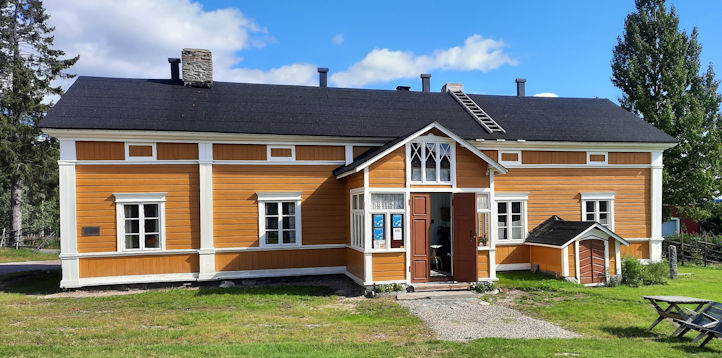Museums
Kemijärvi Local History Museum

Located right in the centre of Kemijärvi, this museum tells the story of peasant life in Kemijärvi in the early 1900s. The main building is a peasant house from the 19th century in its original location. The museum’s exhibitions depict the traditional livelihoods of Kemijärvi over a hundred years: cattle farming, forestry, fishing, hunting and reindeer husbandry. The museum is run by the Kemijärven Kotikiekerö Association.
Pekka was a brisk and enterprising man. He married in 1760 and bought a new farm cleared by chaplain Nils Fellmann. Nils Fellmann and his son Nils Filsmann were married and soon there was a whitewashed new building on the edge of Särkimäki. Even Anna’s grandmother was given a new setting, as she was the daughter of a locksmith. And so began the life of the first host family of the present museum house. A violent smallpox epidemic in 1782 took away mother, father and eldest child. Daughter Maria was only 16 when she was forced to take over the household and seven siblings.
The present main building was built in the late 1700s. The museum grounds include a handsome main building, barns, a barn, a smoke sauna, a barn and a stable. Welcome to discover the peasant life and traditional livelihoods of the turn of the 1700s and 1800s.
Kemijärvi Local Heritage Museum is open in summer and winter by appointment. The museum is located 1 km from the city centre towards Rovaniemi and 500 m from the railway station.
Open at summer
14.6.-10.8. Weekdays: Thursday, Friday, Saturday 12-16
Admission fees:
- Adults 10 €
- Children free
- Families, including children under 16: 15 €
- Pensioners 5 €
- Groups: 5 € / person
- Guided school groups: free admission
- Guided tour when the museum is closed: 20 € / person
Admission includes a guided tour of the museum
The museum has four exhibitions. The largest exhibition is the basic exhibition of the whole museum area, which depicts events in Kemijärvi from the 1800s to the last century. A separate exhibition space has been set up for Lyyli Perunga, which is complemented by a small country kitchen with artefacts. The wartime exhibition is the latest exhibition to be assembled. The museum has 3 500 objects and 4 000 photographs. The museum guide is Pekka Narkilahti, the chairman. The museum sells books, postcards and mourning addresses as ancillary products. The 150th anniversary of Kemijärvi will be accompanied by the sale of the commemorative book “On these shores with love”, published by the Foundation and edited by Pirjo Maunu, and the booklet of the writing competition “One hundred and fifty carriages”.
Kemijärven Kotikiekerö ry.
Sepänkatu 4, 98120 Kemijärvi
Phone number during museum opening hours: + 358 (0) 40 503 9591
Phone number at other times: + 358 (0) 400 157 737
kkiekero@gmail.com
Facebook: Kotiseutuyhdistys Kemijärven Kotikiekerö
Kemijärvi Snowmobile Museum
The Kemijärvi Snowmobile and Sawmill Museum has a unique collection of snowmobiles from the past to the present. There are also almost 400 different chainsaws on display.
The snowmobile museum has over 100 sledges, mainly from the 1960s and 1970s.
For example:
- Ummenajokas (imitation from -26)
- Terhi 10 from the 70s
- Larvenit from the 70s
- The first and oldest factory-built sled bought in Finland, Ski-doo vm. -61
- Yamaha SWs from the 70’s
- Lynx AS50, 20 from the 60’s
- Winhouses, Ockelbos, Jupiters, ALKO, “rope machine”, Linson 64, equipment, tools, photos and other things related to sledding culture.
The museum is open by appointment. Contact us:
Lasse Marin +358 (0) 40 554 0011
Varastotie 11, 98100 Kemijärvi
Luusua Village Museum
The island of Luusuansaari was already reasonably populated in the 1700s. From here, the current settlement of Luusua village gradually expanded towards the mainland.
The village museum building Alimmainen was built in 1781 and is one of the oldest buildings in Kemijärvi. The present museum building was inhabited until 1947. The building was renovated by the Luusua Museum Committee in the 1970s. The museum catalogues about 400 different old objects, the oldest of which are over 200 years old.
The museum is open by appointment.
For more information, contact Juhani Kulmunki, chairman of the museum committee, 040 522 8644 or Teuvo Alaluusua 040 773 7213